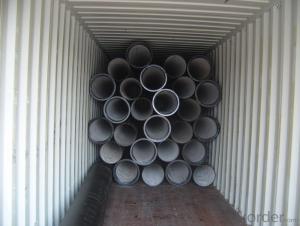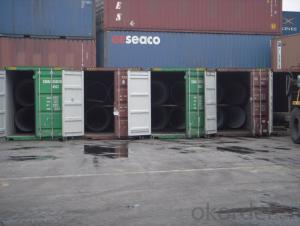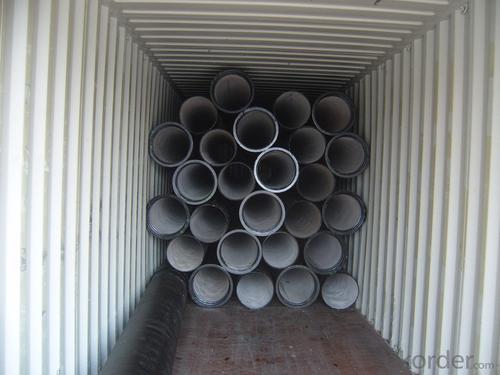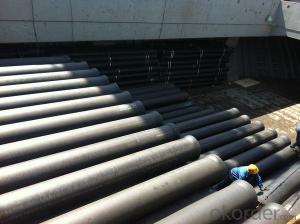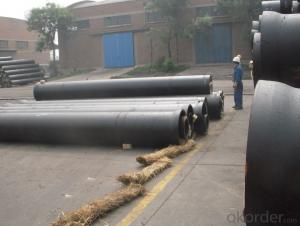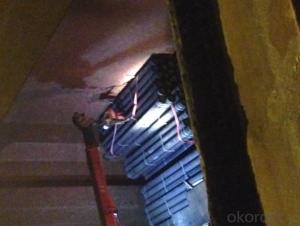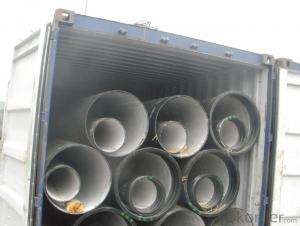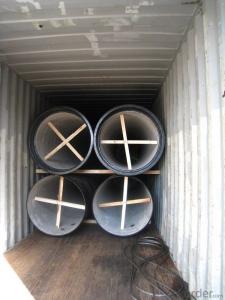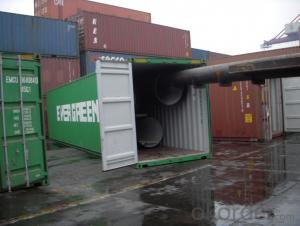DUCTILE IRON PIPE AND PIPE FITTINGS C CLASS DN100
- Loading Port:
- Tianjin
- Payment Terms:
- TT OR LC
- Min Order Qty:
- 23 pc
- Supply Capability:
- 3000 pc/month
OKorder Service Pledge
OKorder Financial Service
You Might Also Like
· Material : Ductile Cast Iron
· Size Range : DN 80mm to DN 2000mm
· Unit Effective Length : 6m or 5.7m
· Manufacture Standard: ISO 2531:1998/ EN 545:2006/EN 598:2007
· Annual capacity : 200,000 tons
· Coating Exterior: Zinc 130g/m2 according to ISO 8179-1 and bitumen coating 70 microns.
· Cement Interior: Portland Cement/ High Alumina Cement/ Sulphate Resisting Cement Lining according to ISO 4179
· Special requirements on external coating and internal lining can be applied
· We also provide accessories such as SBR/EPDM rubber gaskets, lubricant paste, pipe caps, PE sleeves, etc.
Additional Parts:
Each pipe is strictly inspected according to related standard to ensure permanently high performance.
Easy Installation at site and service free for life
Long Service Lifespan
Quotation will arrive you within 24hours once we get your inquiry.
We guarantee offering you a competitive price.
A copy of original inspection reports of pipes will be offered after shipment.
Photos of loading process will be sent to the customer after shipment effect.
We will follow-up the delivery progress after shipment effect and update to the customer on weekly basis.
- Q: Ways of connecting ductile iron pipes
- In our country, the national standards stipulated annealing, centrifugal casting, water delivery with ductile iron, straight pipe, pipe fittings, aprons and other technical requirements, China's production of ductile iron pipe products must meet the current national standards.
- Q: The role of chromium in nodular cast iron
- Chromium has better strengthening and toughening effect in nodular cast iron. Chromium containing cast iron has the characteristics of high strength, high elongation, high impact value and low hardness.
- Q: What are the advantages of using ductile iron pipes?
- There are several advantages of using ductile iron pipes. Firstly, they have high tensile strength and durability, making them resistant to cracking and breaking under pressure or external forces. Secondly, ductile iron pipes have excellent corrosion resistance, allowing them to withstand harsh environments and reducing the risk of leaks and pipe failures. Additionally, they provide better flow characteristics due to their smooth internal surface, ensuring efficient transportation of fluids. Lastly, ductile iron pipes have a long lifespan and require minimal maintenance, resulting in cost savings and reliable infrastructure for water supply and wastewater management systems.
- Q: Are ductile iron pipes suitable for use in wastewater pumping stations?
- Yes, ductile iron pipes are suitable for use in wastewater pumping stations. Ductile iron is a strong and durable material that can withstand the harsh conditions and corrosive nature of wastewater. It has excellent resistance to corrosion and can handle high-pressure environments, making it an ideal choice for transporting wastewater in pumping stations. Additionally, ductile iron pipes have a long lifespan and require minimal maintenance, reducing the overall cost of operation and ensuring reliable and efficient wastewater transportation.
- Q: What is the excavation width of ductile iron pipes with diameters greater than 1400?
- Then, according to the soil characteristics, different slopes are calculated, and the width of the excavation is calculated according to the depth and slopeIf the soil is soft, high water content and easy to collapse, the excavation width will be wide, otherwise the slope will be steep and the excavation width will be narrow
- Q: What is the maximum temperature that ductile iron pipe can handle?
- The maximum temperature that ductile iron pipe can handle typically ranges between 350-400 degrees Fahrenheit.
- Q: Can ductile iron pipes be used for underground geothermal systems?
- Indeed, underground geothermal systems can utilize ductile iron pipes. Renowned for their robustness, endurance, and immunity to corrosion, these pipes are apt for myriad purposes, encompassing underground geothermal systems. They possess the capacity to withstand elevated temperatures and pressures, rendering them optimal for conveying scorching geothermal fluids. Moreover, ductile iron pipes boast a protracted lifespan and the ability to endure the soil shifts and strains inherent in subterranean installations. Consequently, they represent a dependable selection for underground geothermal systems.
- Q: What is the relationship between the direction of the spigot and the direction of the flow in the ductile iron pipe?
- The utility model is mainly used for conveying water, and is an ideal choice for tap water pipes.
- Q: Can ductile iron pipe be used for stormwater systems?
- Yes, ductile iron pipe can be used for stormwater systems. Ductile iron pipe is a strong and durable material that is commonly used for various applications, including stormwater systems. It has excellent corrosion resistance, making it suitable for handling stormwater, which often contains debris and chemicals. Ductile iron pipe also has high tensile strength and can withstand heavy loads and pressures, making it a reliable choice for stormwater systems that may experience significant flow rates and occasional surges. Additionally, ductile iron pipe is available in various sizes and configurations, allowing for flexibility and adaptability in designing stormwater systems.
- Q: Are ductile iron pipes suitable for use in oil refineries?
- Yes, ductile iron pipes are suitable for use in oil refineries. Ductile iron is a type of cast iron that offers a unique combination of strength, durability, and flexibility, making it an excellent choice for various applications, including oil refineries. One of the key advantages of ductile iron pipes is their high tensile strength, allowing them to withstand the high pressure and stress commonly found in oil refining processes. This strength is crucial for the transportation of various fluids, including crude oil, refined petroleum products, and chemicals within the refinery. Additionally, ductile iron pipes have excellent corrosion resistance properties, making them highly resistant to the corrosive effects of oil, chemicals, and other substances typically present in oil refineries. This corrosion resistance ensures the longevity and reliability of the pipes, reducing the need for frequent maintenance and replacement. Furthermore, ductile iron pipes have exceptional ductility, which means they can absorb and withstand significant impacts and vibrations without fracturing or breaking. This quality is advantageous in oil refineries where there may be frequent movement or potential stressors due to machinery, equipment, or ground settlement. Moreover, ductile iron pipes have a smooth interior surface that reduces friction, allowing for efficient fluid flow and minimizing pressure loss. This characteristic is essential in oil refineries, as it helps optimize the transportation of fluids, ensuring a smooth and reliable production process. In conclusion, ductile iron pipes are suitable for use in oil refineries due to their high tensile strength, corrosion resistance, ductility, and smooth interior surface. These pipes provide a reliable and durable solution for transporting various fluids within the refinery, contributing to the efficient and safe operation of oil refining processes.
Send your message to us
DUCTILE IRON PIPE AND PIPE FITTINGS C CLASS DN100
- Loading Port:
- Tianjin
- Payment Terms:
- TT OR LC
- Min Order Qty:
- 23 pc
- Supply Capability:
- 3000 pc/month
OKorder Service Pledge
OKorder Financial Service
Similar products
Hot products
Hot Searches
Related keywords
